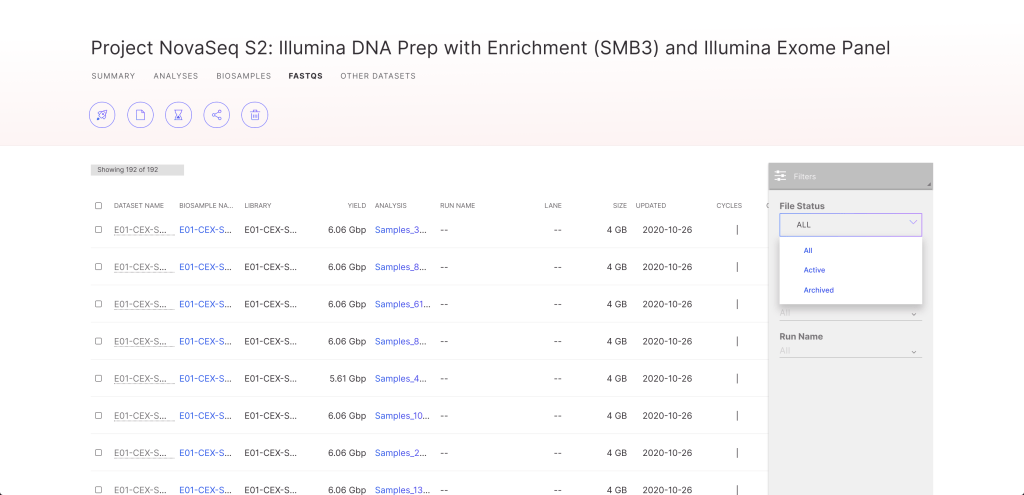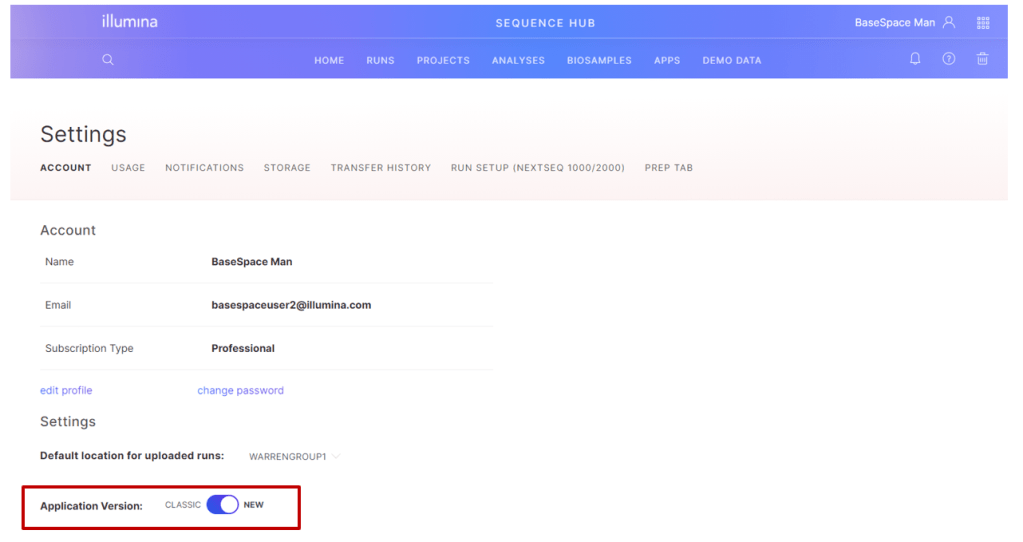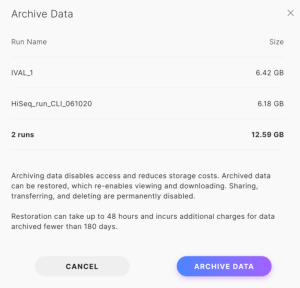- Home
- News & Updates
- Archive and Restore in BaseSpace Sequence Hub
-
BaseSpace™ Sequence Hub
-
News
- 12/19/2020
Archive and Restore in BaseSpace Sequence Hub
The BaseSpace Sequence Hub (BSSH) team is excited to share the newest feature for the community – Archive and Restore! BSSH has enabled users to store large volumes of data, securely, and reliably for over five years – now, with the newly released archive and restore feature you can maximize available storage and reduce cost. Below are some commonly asked questions and answers about this new feature. As always, if you have more questions, just reach out to your Illumina team.
Why do I want to archive my data in BaseSpace Sequence Hub?
Archiving data moves data to a special tier of storage specifically designated for infrequently accessed data. This type of storage offers a significant cost savings over the Standard Storage options for data that needs to be accessed on-demand.
When should I archive my data rather than delete it?
You should archive data when you no longer need to access the data frequently but still need to keep the data for an extended period of time. Archiving the data allows for retrieval while saving storage cost.
What would my storage cost be if I start moving my data to Archival Storage?
The costs for storage products are described in the table below*:
| Storage Product | Cost | What it is |
| Standard Storage | 22.5 iCredit per Terabyte (TB) per month | Calculated based on the amount of data stored in Standard Storage, which is the default storage tier. Users can access their data instantly without access fees. |
| Archive Storage | 2.0 iCredits per TB per month | Calculated based on the amount of data stored in archive storage. This takes approximately 2 days to restore. Transfer and restore incur fees. |
| Transfer to Archive | 20 iCredits per TB per transfer | Cost to transfer data to archive storage. It is charged per “transfer” and prorated based on the amount of data being archived. |
| Restore from Archive | 30 iCredits per TB per restore | Cost to restore data from archive. It is charged per “retrieval” and prorated based on the amount of data being restored |
The following table shows the costs comparison between standard storage and archive data:
| Scenario | Calculation | Cost |
| Maintain data in Standard storage | 2 TB * 22.5 iCredits/TB/month * 24 months | 1080 iCredits |
| Archive data after 1 month | Standard storage for 1 months 2 TB * 22.5 iCredits/TB/month * 1 months = 45 Move to archive 2 TB * 20 iCredits/TB = 40 Archival storage 2 TB * 2 iCredits/TB/month * 23 months = 92 | 177 iCredits |
*The prices listed in this article reflect the pricing at the time of publication. For the latest prices, see the iCredit page or Archival Storage page.
Can I access my files when my data is in Archival Storage?
Once data has been archived, you will need to restore the data before it can be accessed again.
Can I delete files that are in Archival Storage?
Yes, you can delete files without needing to restore first. Regardless if they are in standard or archived state, deleting data means moving the data to the trash and still account for storage until you empty the trash.
How long should I keep my data in Archival Storage minimally to save storage cost?
In general, restoring data from Archival Storage within 3 months of archiving results in higher storage cost.
Is there a minimum amount of time the data needs to stay in Archival Storage before it can be restored or deleted?
No. There are no early restore or early deletion fees.
When can I restore my data from Archival Storage?
As soon as all of your data is fully archived, you can restore it. Keep in mind that the archive and restore operations are not immediate–either operation may take up to several days to complete.
How will I know what data is archived?
For a specific run, the File Status will be listed as either "Archived" or "Active". Additionally, the Runs master list will have a File Status filter, allowing archived runs to be shown or hidden in the list.
For datasets, the menu “Project > FASTQs” and “Project > Other Datasets lists” will have a File Status filter. File Status is not displayed as a column in the master list and can be accessed from the Filters list.

Who can archive and restore data?
The ability to archive and restore data is restricted by the following criteria:
- The data must be owned by a Workgroup. This means users of free trial or Basic tier cannot archive or restore data.
- The Workgroup must have "Application Version" set to "New". This can be configured from the Settings page by the Workgroup owner or admin.

Which subscription tiers can use the Archive and Restore features?
This Archive and Restore features are available to both Professional and Enterprise subscription customers. They are not available for Free Trials and Basic tier customers.
Is there a way to archive or restore using CLI?
Yes. For more information, see the Archival Storage documentation or BaseSpace Sequence Hub CLI documentation
Where and how can I archive files?
To archive a run using BaseSpace Sequence Hub UI:
From the Run Master List, select at least one run (bulk archive is supported)
- Select File > Archive > Archive Data

- Review the modal summarizing the number of runs and total size of data to be archived.
- Confirm the archive operation to begin the archive process.
For detailed information on how to use the archive feature, see the BSSH Archival Storage documentation.
How is your pricing compared to AWS?
Our pricing model is different from AWS’s. We use a simplified model with a single, one-off fee for archiving and restoring data, along with a low monthly rate. AWS has additional charges for many transactions that are included in our rates, such as per-file access and early deletion fees. We aim to keep pricing competitive, through our all-inclusive and straightforward base monthly rate. With simple and easy archive and restore functionality, you don’t need to move data to AWS to archive when you can keep your data in the BaseSpace Sequence Hub.
